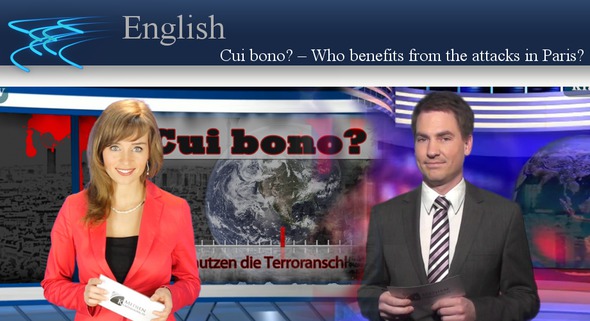Terror (English)
Cui bono? – Who benefits from the attacks in Paris?
23.12.2015
Subtitle "Afrikaans" was produced by machine.Subtitle "አማርኛ" was produced by machine.Subtitle "العربية " was produced by machine.Subtitle "Ārāmāyâ" was produced by machine.Subtitle "azərbaycan dili " was produced by machine.Subtitle "беларуская мова " was produced by machine.Подзаглавието "България" е създадено от машина.সাবটাইটেল "বাংলা " মেশিন দ্বারা তৈরি করা হয়েছিল।Subtitle "བོད་ཡིག" was produced by machine.Subtitle "босански" was produced by machine.Subtitle "català" was produced by machine.Subtitle "Cebuano" was produced by machine.Subtitle "ગુજરાતી" was produced by machine.Subtitle "corsu" was produced by machine.Podtitul "Čeština" byl vytvořen automaticky.Subtitle "Cymraeg" was produced by machine.Subtitle "Dansk" was produced by machine.Untertitel "Deutsch" wurde maschinell erzeugt.Subtitle "Untertitel" was produced by machine.Ο υπότιτλος "Ελληνικά" δημιουργήθηκε αυτόματα.Subtitle "English" was produced by machine.Subtitle "Esperanto" was produced by machine.El subtítulo "Español" se generó automáticamente.Subtitle "Eesti" was produced by machine.Subtitle "euskara" was produced by machine.Subtitle "فارسی" was produced by machine.Subtitle "Suomi" was produced by machine.Le sous-titrage "Français" a été généré automatiquement.Subtitle "Frysk" was produced by machine.Subtitle "Gaeilge" was produced by machine.Subtitle "Gàidhlig" was produced by machine.Subtitle "Galego" was produced by machine.Subtitle "Schwizerdütsch" was produced by machine.Subtitle "هَوُسَ" was produced by machine.Subtitle "Ōlelo Hawaiʻi" was produced by machine.Subtitle "עברית" was produced by machine.Subtitle "हिन्दी" was produced by machine.Subtitle "Mẹo" was produced by machine.Podnaslov "Hrvatski" generiran je automatski.Subtitle "Kreyòl ayisyen " was produced by machine.Subtitle "Magyar" was produced by machine.Subtitle "Հայերեն" was produced by machine.Subtitle "Bahasa Indonesia " was produced by machine.Subtitle "Asụsụ Igbo " was produced by machine.Textun"Íslenska" var framkvæmt vélrænt.Sottotitoli "Italiano" sono stati generati con l'intelligenza artificiale.字幕は"日本語" 自動的に生成されました。Subtitle "Basa Jawa" was produced by machine.Subtitle "ქართული" was produced by machine.Subtitle "қазақ тілі " was produced by machine.Subtitle "ភាសាខ្មែរ" was produced by machine.Subtitle "ಕನ್ನಡ" was produced by machine.Subtitle "한국어" was produced by machine.Subtitle "कोंकणी語" was produced by machine.Subtitle "کوردی" was produced by machine.Subtitle "Кыргызча" was produced by machine.Subtitle " lingua latina" was produced by machine.Subtitle "Lëtzebuergesch" was produced by machine.Subtitle "Lingala" was produced by machine.Subtitle "ພາສາ" was produced by machine.Antraštė "Lietuvių" buvo sukurta mašina.Subtitle "Latviešu" was produced by machine.Subtitle "fiteny malagasy" was produced by machine.Subtitle "te reo Māori" was produced by machine.Subtitle "македонски јазик" was produced by machine.Subtitle "malayāḷaṁ" was produced by machine.Subtitle "Монгол хэл" was produced by machine.Subtitle "मराठी" was produced by machine.Subtitle "Bahasa Malaysia" was produced by machine.Subtitle "Malti" was produced by machine.Subtitle "မြန်မာစာ " was produced by machine.Subtitle "नेपाली" was produced by machine.Ondertitels "Nederlands" machinaal geproduceerd.Subtitle "Norsk" was produced by machine.Subtitle "chiCheŵa" was produced by machine.Subtitle "ਪੰਜਾਬੀ" was produced by machine.Podtytuł "Polska" został utworzony przez maszynę.Subtitle "پښتو" was produced by machine.Legenda "Português" foi gerada automaticamente.Subtitle "Română" was produced by machine.Subtitle "Язык жестов (Русский)" was produced by machine.Субтитры "Pусский" были созданы машиной.Subtitle "Kinyarwanda" was produced by machine.Subtitle "सिन्धी" was produced by machine.Subtitle "Deutschschweizer Gebärdensprache" was produced by machine.Subtitle "සිංහල" was produced by machine.Subtitle "Slovensky" was produced by machine.Subtitle "Slovenski" was produced by machine.Subtitle "gagana fa'a Samoa" was produced by machine.Subtitle "chiShona" was produced by machine.Subtitle "Soomaaliga" was produced by machine.Titra "Shqip" u krijua automatikisht.Превод "србски" је урађен машински.Subtitle "Sesotho" was produced by machine.Subtitle "Basa Sunda" was produced by machine.Undertext "Svenska" är maskinell skapad.Subtitle "Kiswahili" was produced by machine.Subtitle "தமிழ்" was produced by machine.Subtitle "తెలుగు" was produced by machine.Subtitle "Тоҷикй" was produced by machine.Subtitle "ภาษาไทย" was produced by machine.ንኡስ ኣርእስቲ "ትግርኛ" ብማሽን እዩ ተፈሪዩ።Subtitle "Türkmençe" was produced by machine.Subtitle "Tagalog" ay nabuo sa pamamagitan ng makina.Altyazı "Türkçe" otomatik olarak oluşturuldu.Subtitle "татар теле" was produced by machine.Subtitle "Українська " was produced by machine.ذیلی عنوان "اردو" مشین کے ذریعہ تیار کیا گیا تھا۔Subtitle "Oʻzbek" was produced by machine.Phụ đề được tạo bởi máy.Subtitle "Serbšćina" was produced by machine.Subtitle "isiXhosa" was produced by machine.Subtitle "ייִדיש" was produced by machine.Subtitle "Yorùbá" was produced by machine.Subtitle "中文" was produced by machine.Subtitle "isiZulu" was produced by machine.
kla.TV accepts no liability for defective translation.kla.TV accepts no liability for defective translation.kla.TV accepts no liability for defective translation.kla.TV accepts no liability for defective translation.kla.TV accepts no liability for defective translation.kla.TV accepts no liability for defective translation.kla.TV не носи отговорност за некачествен превод.অপর্যাপ্ত অনুবাদের জন্য kla.TV কোন দায় বহন করে না।kla.TV accepts no liability for defective translation.kla.TV accepts no liability for defective translation.kla.TV accepts no liability for defective translation.kla.TV accepts no liability for defective translation.kla.TV accepts no liability for defective translation.kla.TV accepts no liability for defective translation.kla.TV nenese žádnou odpovědnost za chybné překlady.kla.TV accepts no liability for defective translation.kla.TV accepts no liability for defective translation.kla.TV übernimmt keine Haftung für mangelhafte Übersetzung.kla.TV accepts no liability for inadequate translationΗ kla.TV δεν φέρει καμία ευθύνη για ανεπαρκή μετάφραση.kla.TV accepts no liability for defective translation.kla.TV accepts no liability for defective translation.kla.TV no se hace responsable de traducciones incorrectas.kla.TV accepts no liability for defective translation.kla.TV accepts no liability for defective translation.kla.TV accepts no liability for defective translation.kla.TV accepts no liability for defective translation.kla.TV n'assume aucune responsabilité en cas de mauvaise traduction.kla.TV accepts no liability for defective translation.kla.TV accepts no liability for defective translation.kla.TV accepts no liability for defective translation.kla.TV accepts no liability for defective translation.kla.TV accepts no liability for defective translation.kla.TV accepts no liability for defective translation.kla.TV accepts no liability for defective translation.kla.TV accepts no liability for defective translation.kla.TV accepts no liability for defective translation.kla.TV accepts no liability for defective translation.kla.TV ne preuzima nikakvu odgovornost za neadekvatne prijevode.kla.TV accepts no liability for defective translation.kla.TV nem vállal felelősséget a hibás fordításértkla.TV accepts no liability for defective translation.kla.TV accepts no liability for defective translation.kla.TV accepts no liability for defective translation.kla.TV tekur enga ábyrgð á áræðanleika þýðingarinnarKla.TV non si assume alcuna responsabilità per traduzioni lacunose e/o errate.Kla.TV は、不適切な翻訳に対して一切の責任を負いません。kla.TV accepts no liability for defective translation.kla.TV accepts no liability for defective translation.kla.TV accepts no liability for defective translation.kla.TV accepts no liability for defective translation.kla.TV accepts no liability for defective translation.kla.TV accepts no liability for defective translation.kla.TV accepts no liability for defective translation.kla.TV accepts no liability for defective translation.kla.TV accepts no liability for defective translation.kla.TV accepts no liability for defective translation.kla.TV accepts no liability for defective translation.kla.TV accepts no liability for defective translation.kla.TV accepts no liability for defective translation.kla.TV neprisiima jokios atsakomybės už netinkamą vertimą.kla.TV accepts no liability for defective translation.kla.TV accepts no liability for defective translation.kla.TV accepts no liability for defective translation.kla.TV accepts no liability for defective translation.kla.TV accepts no liability for defective translation.kla.TV accepts no liability for defective translation.kla.TV accepts no liability for defective translation.kla.TV accepts no liability for defective translation.kla.TV accepts no liability for defective translation.kla.TV accepts no liability for defective translation.kla.TV accepts no liability for defective translation.kla.TV aanvaardt geen aansprakelijkheid voor foutieve vertalingen.kla.TV accepts no liability for defective translation.kla.TV accepts no liability for defective translation.kla.TV accepts no liability for defective translation.kla.TV nie ponosi odpowiedzialności za wadliwe tłumaczenie.kla.TV accepts no liability for defective translation.kla.TV não se responsabiliza por traduções defeituosas.kla.TV accepts no liability for defective translation.kla.TV accepts no liability for defective translation.kla.TV не несет ответственности за некачественный перевод.kla.TV accepts no liability for defective translation.kla.TV accepts no liability for defective translation.kla.TV accepts no liability for defective translation.kla.TV accepts no liability for defective translation.kla.TV accepts no liability for defective translation.kla.TV accepts no liability for defective translation.kla.TV accepts no liability for defective translation.kla.TV accepts no liability for defective translation.kla.TV accepts no liability for defective translation.kla.TV nuk mban asnjë përgjegjësi për përkthime joadekuate.kla.TV не преузима никакву одговорност за неадекватне преводе..kla.TV accepts no liability for defective translation.kla.TV accepts no liability for defective translation.Kla.TV tar inget ansvar för felaktiga översättningar.kla.TV accepts no liability for defective translation.kla.TV accepts no liability for defective translation.kla.TV accepts no liability for defective translation.kla.TV accepts no liability for defective translation.kla.TV accepts no liability for defective translation.kla.TV ንዝኾነ ጉድለት ትርጉም ዝኾነ ይኹን ሓላፍነት ኣይቅበልን እዩ።kla.TV accepts no liability for defective translation.kla. Walang pananagutan ang TV sa mga depektibong pagsasalin.kla.TV hatalı çeviriler için hiçbir sorumluluk kabul etmez.kla.TV accepts no liability for defective translation.kla.TV accepts no liability for defective translation.kla.TV عیب دار ترجمہ کے لیے کوئی ذمہ داری قبول نہیں کرتا ہے۔kla.TV accepts no liability for defective translation.Kla. TV không chịu trách nhiệm về bản dịch không đầy đủ.kla.TV accepts no liability for defective translation.kla.TV accepts no liability for defective translation.kla.TV accepts no liability for defective translation.kla.TV accepts no liability for defective translation.kla.TV accepts no liability for defective translation.kla.TV accepts no liability for defective translation.
Cui bono? – Who benefits from the attacks in Paris?
23.12.2015
www.kla.tv/7374
In the wave of terror on 13th of November in Paris, more than 130 people were killed and more than 300 people were injured. The ori-ginator is supposed to be the “Islamic State”. Immediately after the attacks there are many speculations how the Western world should react and act. In this broadcasting we want to answer those speculations from a different side. We want to ask: cui bono?
[continue reading]
Cui bono? – Who benefits from the attacks in Paris?
Download broadcast and attachments in the wanted quality:
Hashtags:
Useage rights:
Standard-Kla.TV-Licence

 Deutsch-ID setzten
Deutsch-ID setzten



Sendungstext
herunterladen
23.12.2015 | www.kla.tv/7374
In the wave of terror on 13th of November in Paris, more than 130 people were killed and more than 300 people were injured. The ori-ginator is supposed to be the “Islamic State”. Immediately after the attacks there are many speculations how the Western world should react and act. In this broadcasting we want to answer those speculations from a different side. We want to ask: cui bono? This is a Latin phrase and means: “Who ben-efits from it?” This question wants to give more food for thought and wants to rise ques-tions on the backgrounds of the terror attacks. Cui bono? As the attackers were able to move freely in France and Belgium, being able to coordinate their actions, the call for activities of the secret services and the police will become louder. As a result, there will be inevitably more surveillance in public. But also the internet and telecommunication will be more controlled by secret services and searchers. For security reasons, personal rights like postal privacy, right to integrity of housing or freedom of assembly will be se-verely restricted. Our fear in Europe, that ter-rorists could threaten our lives and strike eve-rywhere serves those circles who want to re-place our national police and military forces by a world police and a world army through excessive demand. They purposefully restrict our freedom of opinion. Ban on meetings and speaking can easily be extended on political dissidents, that means dissenters of all kind. Those have been a thorn in the side of the established media and parties for a long time. We refer to the interview with Geraiod O Colmáin (www.kla.tv/7198). The state of emergency declared by President Hollande can lead to emergency laws which will more and more consolidate a global police state. As the terrorist threat cannot be limited to France, other EU countries would need to follow this example. Cui Bono? As all of the identified attackers had contact to Syria and the IS, it will be of use for all those who want to end the frozen conflict in Syria by military means as soon as possible. Due to the emotionally heated at-mosphere in Paris and the whole world, the readiness for determined military action against the IS in Syria has significantly in-creased. This instrumentalization of fear is already known since the attack on the World Trade Center in 2001 and the wars that were thereby legitimated in Afghanistan and Iraq. Those wars are now generally known as con-trary to the international law and are classified as serious mistakes because firstly, they were started on the base of wrong assertions, secondly they could not stem the international terror and thirdly, they left behind two completely unstable countries. Insofar it is important to pay particular attention so that the mistakes of history are not repeated. Someone who benefits from the people’s fear to justify more wars must be considered a war criminal. Such a war can also have global conse-quences: France is member of the NATO. According to article 5 of the NATO treaty, the so called “mutual defense clause” can be invoked. If one state of this alliance is attacked from the exterior, the other alliance partners have to provide military support to the attacked NATO country. That means: If the mutual defense clause will be invoked, an extension of the war in Syria including ground forces would be a realistic scenario in the fight against the IS. But who would benefit from this new military escalation? We switch to the studio Rottweil. Thank you studio Dresden. Yes, who would benefit from this new military escalation? Some political circles, especially the so-called neo-cons in the USA have since long insisted on the suppression of the IS through ground troops. Why? Since the beginning of the Russian air strikes in September, the Syrian army has gained significant ground and is now encircling rebels. Those mostly known as “moderate” rebels are supported by the USA with much money, instructors and weapons. To avoid these mercenary troops from being crushed by the regular Syrian army, they would have to be evacuated so one could use them again later on, in order to promote the plan of the neocons – which is to overthrow Assad. At this point, the neocons, that means the new-conservatives, reveal themselves as wolves in sheep’s clothing. They are in fact as little conservative as the so-called neo-Nazis have a true national atti-tude. Similar actions have already been carried out by the NATO ally Turkey during the last few weeks and IS fighters were brought to safety from Russian-Syrian attacks. If NATO ground forces would be sent to Syria, this would also serve Turkey. For a few months, the Turkish president Erdogan has been waging a hidden war against the Kurdish organisations PKK and YPG in the north of Syria and Iraq. A broad anti-terror operation of the NATO could be useful for Erdogan to take even tougher actions against the Kurdish militias which he also classifies to be a terror organization. A NATO case of alliance according to Article 5 would enable Erdogan to employ ground forces and to invade the North of Syria. Russia’s president Putin would also appre-ciate a common action against the IS, be-cause he also fears the Islamic State to ex-tend to the Caucasus and Central Asia. His appeal is: “The international community must unite for an effective war against the devil.” The German BILD magazine asked the ques-tion: “After the terror in Paris, do we have to go to war now?” Probably the answer will be: Yes. At the moment, one can only specu-late about the extent of this war. But due to many different interests and obscure military coalitions, the situation is particularly preca-rious. In 1914, one attack in similar confusing constellations was enough to lit the powder keg. The result was World War I. Cui bono? Who benefits from it? In criminolo-gy, this fundamental question serves to find perpretators and backers. Therefore, one last note concerning this matter: In the end, a big war always serves the same big earners who have the politicians of almost every country in their pocket through their economic power: the armaments companies and major banks. In order to buy weapons, war parties need credits. This is basically in the interest of the banks and global rulers. That way, the states are more and more driven into debts and, depending on the course of the war, completely destabilized. As soon as states have lost their ability to act - and the call for a strong, regulating hand becomes louder and louder, the time has come for the global strategists to install once and for all their inhuman New World Order. This plan needs to be brought into the public conscience unequivocally, if we don’t want to end up in a global dictatorship. Therefore, please spread our broadcastings. Goodbye.
from ro. and sl.
http://www.faz.net/aktuell/politik/terror-in-paris/frankreich-usa-fordern-mehr-engagement-gegen-is-terrorismus-13916648.html
http://www.faz.net/aktuell/politik/terror-in-paris/nach-paris-anschlaege-warum-is-auf-kriegserklaerung-wartet-13914393.html
http://deutsche-wirtschafts-nachrichten.de/2015/11/17/frankreich-verbietet-demonstrationen-bei-klimagipfel-in-paris/
http://deutsche-wirtschafts-nachrichten.de/2015/11/01/syrien-us-allianz-fliegt-terroristen-aus-um-sie-vor-russen-zu-schuetzen/
http://deutsche-wirtschafts-nachrichten.de/2015/11/15/anschlaege-von-paris-putin-stellt-die-frage-nach-den-drahtziehern/
http://deutsche-wirtschafts-nachrichten.de/2015/11/15/terror-offene-grenzen-sind-das-problem-nicht-die-fluechtlinge/
http://deutsche-wirtschafts-nachrichten.de/2015/11/15/wegen-terror-bundesregierung-stockt-geheimdienste-massiv-auf/
http://deutsche-wirtschafts-nachrichten.de/2015/11/14/terror-von-paris-putin-ruft-zum-kampf-gegen-den-teufel-auf/
http://deutsche-wirtschafts-nachrichten.de/2015/11/16/frankreich-aenderung-der-verfassung-um-sonder-massnahmen-durchzusetzen/
http://www.faz.net/aktuell/feuilleton/deatten/nach-den-anschl%C3%A4gen-in-paris-notstand-warum-eigentlich-nicht-13917881.html